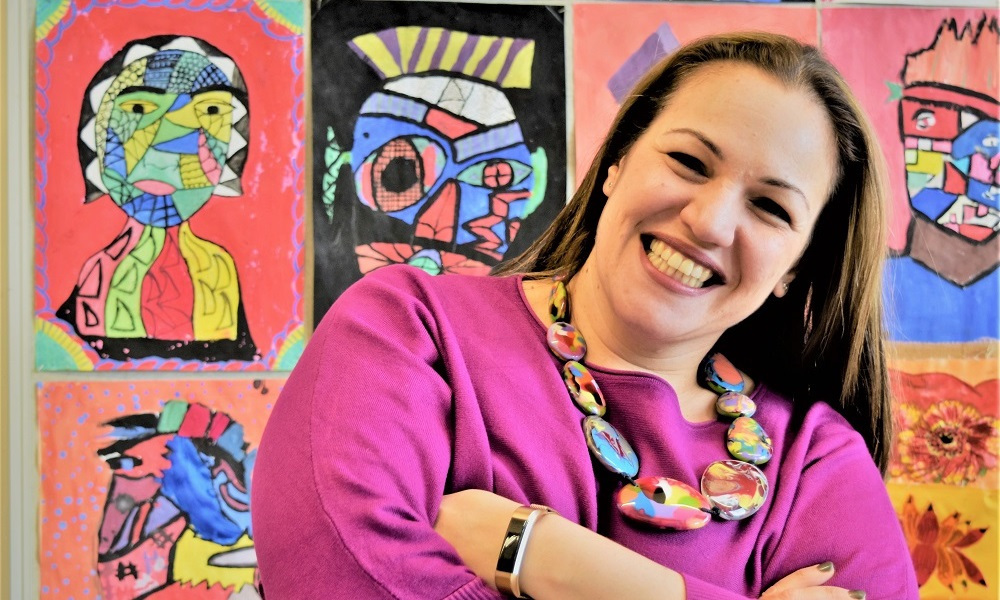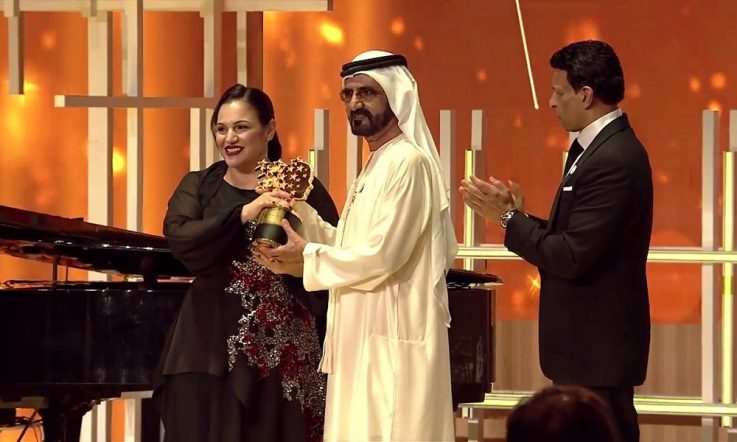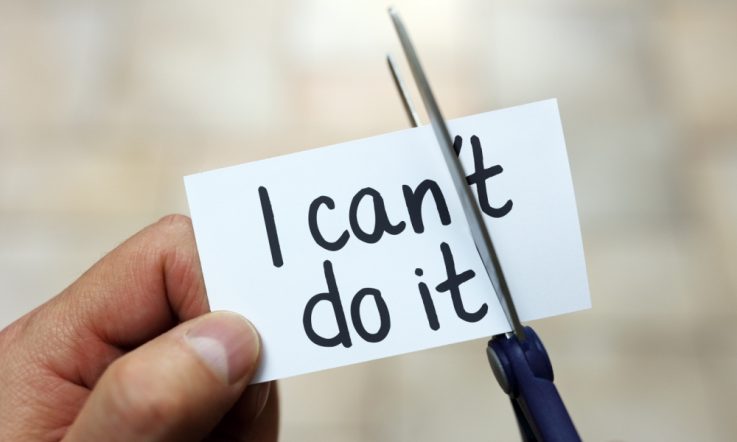This podcast from Teacher magazine is supported by EnhanceTV. EnhanceTV is used in thousands of Australian classrooms to stream educational videos that engage students. EnhanceTV is a not-for-profit, which means more value to educators. EnhanceTV is completely free to K-12 teachers – for more information visit enhancetv.com.au/free
Hello, thank you for downloading this podcast from Teacher magazine – I'm Dominique Russell.
In this episode of Global Education, we're joined by Andria Zafirakou from London, the winner of this year's Global Teacher Prize. The Arts and Textiles teacher explains how she develops meaningful relationships with parents, the importance of professional development and why she thinks schools should stay open outside school hours.
Dominique Russell: So there's a section on the Global Teacher Prize website that says that you work towards not only creating relationships with your students, but with parents as well. So, how do you personally approach developing meaningful relationships with parents in your school community?
Andria Zafirakou: I think it goes from the moment that they walk into the building, so when we interview them and we interview the child – really getting to know them. And something that I've been doing and it's just a tiny little thing – being able to say ‘hello' in their language from the moment they come into the building. That has been quite impactful in terms of the immediate buy-in that you have. So, in terms of being able to welcome a family who are completely intimidated; they may not have been in the school system at all from whichever country they've arrived to us from and being able to say ‘hello', ‘how are you?' perhaps, you just see their faces light up and they just feel automatically welcomed and they know that you are interested in them as an individual. You're interested in them in terms of their culture, their background. That's the first thing we do to get that buy-in.
But, second of all, we do believe that the triangle of success for a child is the relationship between the family, the school and the actual child themselves. So, making sure that we connect that triangle, all the lines towards those three points. We will be constantly talking to parents. So, after the end of day we'll say ‘your child's done this, we're really happy, they've had some great news'. We will encourage our teachers to call home and speak to the parents just to say ‘this child has done an incredible piece of work, please congratulate them'. We're trying to really promote a praised culture and the more that we communicate home and share the good news, the more that we find our parents are really proud and that kind of knocks on to the child, and the child comes into the school and they have a really great experience.
We also do home visits, so if it was a case where we were very concerned that a child wasn't coming in, we will go out and we'll arrange for someone to meet the family at home, or I'll go. Just to make sure that things are okay and just to break the boundaries. Because at the end of the day we're all working for the same thing and that thing is just to make sure the children are the key and our priority so that they can have a really great experience at school.
DR: For sure. You obviously work a lot with your staff, I've read a lot about how you do some cross-curricular work and a lot of stuff with personal development. Is that something you prioritise at your school?
AZ: Well, I lead on that in my school. So, as well as being the classroom teacher I'm also a part of the senior team. My role is that I improve the teaching and learning and professional development of staff. Which is, I think, one of the best roles that you can ever have because what you're doing is you are helping a teacher become even better or just helping them on the journey. So, professional development is really important and it must always be continuous. I don't think there's any teacher who could say ‘right, I know everything'. And I don't think there should be a teacher that says ‘yeah I know everything, I do not need to be developed anymore'. Because the world is changing, our children are learning things from different sources, it's becoming far more internet-based now. And this is an area whereby we need to engage in if we are going to be able to provide and give our students the best outcomes they can get.
So, it is really important that we have this type of approach of constantly wanting to develop and constantly wanting to improve ourselves. Constantly reflecting on our practice and what we can do to improve.
Because that's I think how, as teachers, we stay enthused in our subject. We stay inspired by our profession. On a personal note, there's nothing more significant and more I'm proud of, than when I've trained a teacher from when they've first entered the profession and now they're actually leading departments, leading their own teams, becoming senior leaders themselves. That's a really great feeling for me.
DR: You're obviously an Arts and Textiles teacher. What kind of Arts programs are available to your students, and how do you go about getting the resources for them?
AZ: Our children love Arts, Textiles but they do love the Arts – so, Music and Drama as well. So it really is, and I think it is all about student voice. So what is it that they are asking you to put on for them? So do they want you to have an art club whereby they can come in, sit down, carry on quietly completing their work, or do they want to have somebody to come in who is an artist or a visiting lecturer or somebody in the profession who can just talk to them about what it's like in the profession.
Within my department, the Art department, we have got teachers who are skilled in different media. So, for example, I'm a Textiles specialist and my colleague is a Fine Arts specialist. Somebody else is a 3D specialist. So, using our skills and really saying ‘our children need this, they need to really home in on this particular skill'. We put the after-school provision for them as well as lunchtime clubs, as well as if we think that they will benefit from coming in on a Saturday – so, especially near exam times whereby they have to build their portfolio. As you know – any Art teacher will know – that to write an essay it might take an hour but to complete a really successful, accomplished piece of artwork; that will take five hours. The children do need more time in the specialist rooms so we put it on for them. It's never a question of ‘I haven't got the time' it's a question of ‘how can we make this happen? Who do we need to support us?'
Funding is always a question and issue, but we will beg, steal, borrow, harass in order to make these things happen. It's not just that – we also find that it's really useful working with other schools ... our nearby schools or our nearby primary schools and building relationships, working with those teachers. They know what the curriculum will look like when the kids come to high school and then we also know what they're teaching in primary school. You don't want to repeat the work, as it were, you want to build on their skills. We're trying to really establish a strong community between networking with other schools and teachers just to support our children and building their skills within the Arts.
DR: Yeah, fantastic. As well with your out-of-class initiatives, I found it quite interesting, the boxing club program. Was it something that was successful straight away? Perhaps some of our listeners may be wondering how you're actually able to encourage these students and engage them to get involved with things that are outside of class time.
AZ: Our children, bearing in mind where they're coming from (so, what's outside the school gates). If our children could come to school at 6 am in the morning, they would be here at 6 am in the morning. They love the school. They love being here because they know that they can't … they feel safe, number one, and number two, they are exposed to so many different opportunities.
We go out of our way to say ‘right, okay, you want a dance Bollywood club? Okay, let's see if we can find somebody to lead that on you, but it will be after school. Bring your 10 people, have you got 10 people? Right.' So we give them the leadership of saying ‘what is it that you need? What is it that you want?' Recruit your group, your team, and then we'll see what we can do. We'll put it on for you.
I think it's important now for schools to remain open beyond school time. It may not be easy in terms of staffing them by having teachers do that, but that's when leaders have got to be creative. Because the more we keep the students in school, then we know, number one, they're safe, we know, number two, that we're providing them with opportunities, opening their eyes, increasing their toolkits.
A lot of our children come to us because they know that there are these extra-curricular provisions available. When you see two little girls who are teeny-tiny just punching, really enjoying the boxing club, they're glowing. They feel great, they feel strong, they feel empowered. That's fantastic, that's absolutely a feast for the eyes.
DR: Amazing. Just finally then, have your teaching methods been inspired by any personal mentors of your own?
AZ: That's a really good question. My favourite teacher, the teacher that had the most influence on me was my Music teacher. And just because he was quite extravagant, he was completely loopy. His classes, you would never know what would be coming. They were wild, they were brilliant. They were completely, completely unexpected. I wouldn't say that my classes will ever become like that because that was just so exciting.
I want the children to be engaged. I need them to feel comfortable in my environment. I need them to feel that they can fail and that they can really struggle and that it's okay to struggle. I need them to be working with other students and appreciating other students' work. They will be called upon to critique, called upon to evaluate, called upon to give opinions constantly. And I think that's something that is really powerful and very important which the Arts subjects can do. It's very significant for all children to be able to experience the power of these subjects.
That's all for this episode – to keep listening or to download all of our podcasts for free, whether it's more on Global Education or our series on Behaviour Management, School Improvement, Teaching Methods, Action Research or The Research Files, just visit acer.ac/teacheritunes or soundcloud.com/teacher-ACER. The full transcript of this podcast is available at teachermagazine.com.au. That's where you'll also find the latest articles, videos and infographics for free.
This podcast from Teacher magazine is supported by EnhanceTV. EnhanceTV is used in thousands of Australian classrooms to stream educational videos that engage students. EnhanceTV is a not-for-profit, which means more value to educators. EnhanceTV is completely free to K-12 teachers – for more information visit enhancetv.com.au/free.
Andria Zafirakou says partnering with nearby schools is extremely valuable when preparing children for high school. Is this something your school has considered? How would you implement an educational partnership like this?
When planning extra-curricular activities for your students, what role does student voice have in influencing what clubs and groups are available? How do you ensure your students are able to voice their views?



